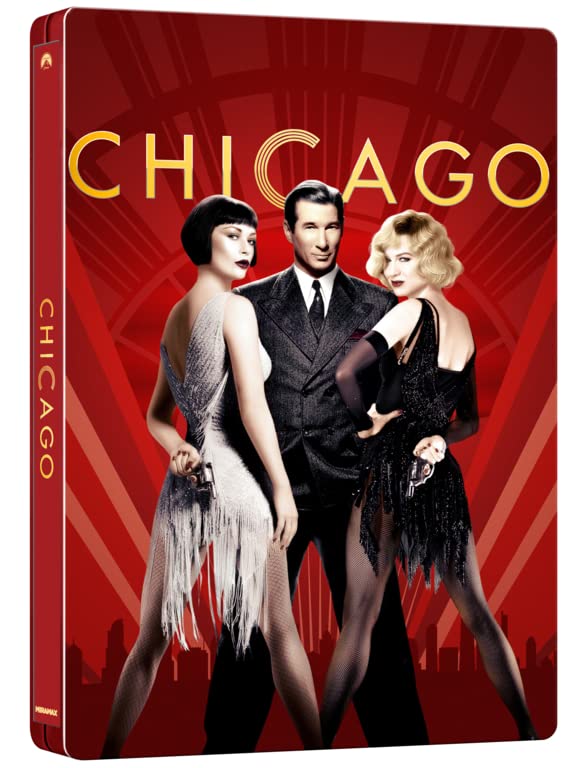
Musical theater is something that I have always enjoyed. It is often difficult to translate a spectacular and engaging play into a great film. There is a certain suspension of disbelief that easily goes with being in a dark theater that sometimes doesn’t track on screen. Chicago is at the top of my list of the most successful versions. I was nervous as to how this could possibly be executed in a way to reflect the magic of the musical numbers. With the majority of the performances taking place in Roxie Hart’s (Renee Zellweger) imagination, director Rob Marshall created a unique experience that captures the glory of the original musical full of “Razzle Dazzle”.
The film opens with multiple murders. Roxie kills her lover Fred (Dominic West), because he lies about getting her to perform at the Onyx club so he could have sex with her, and Velma Kelly (Catherine Zeta-Jones) kills her husband Charlie and her sister Veronica after catching them together. Both are sent to prison for their crimes and end up represented by high profile, ethically challenged, defense attorney Billy Flynn (Richard Gere). Velma and Roxie are introduced to Flynn by Matron “Mama” Morton (Queen Latifah), who is in charge of the cell block. She is nurturing and helpful for a price.
Fame and headlines are all that Velma and Roxie are interested in and Roxie’s trial provides this opportunity to them both. Flynn is able to masterfully manipulate the media, especially radio personality Mary Sunshine (Christine Baranski). Roxie’s husband Amos (John C. Reilly) doesn’t know which way is up as he is too trusting and naive but stays devoted to her throughout the trial. Roxie and Velma quickly learn how fickle the news media can be and end up having to rely on each other to regain their much-needed attention and in order to get back up on stage performing.
The casting was impeccable adding to the overall success of the film. Each character is given at least one standout musical number; it truly is a collaborative effort. Reilly was the most shocking. His heartbreaking performance of “Mister Cellophane” brings tears to my eyes every time. “Cell Block Tango” and “We Both Reached for the Gun” are the most overall impressive numbers and worthy of multiple viewings.
The video has been given a 1080p/MPEG-4 AVC encoded transfer displayed at the original aspect ratio of 1.85:1. The colors pop in strong hues. Blacks are inky and one darkened scene intentionally has Amos almost swallowed by the shadows as he sits in Flynn’s office lobby. The image captures the depth of Marshall’s staging and the sharp focus captures fine texture seen in the costumes and sets. There are moments of posterization, as seen during the opening number, “All That Jazz,” as Velma and the dancers perform on stage amid the smoke and under colored lights. Some of the digital effects seen in establishing shots look artificial because of the high definition.
The audio is available in Dolby TrueHD 7.1. The songs (music by John Kander, lyrics by Fred Ebb) sound robust with the vocals coming through the front center channel and the music flowing out of the surrounds. Ambient sounds augment the scenes. Dialogue is clear. The subwoofer delivers strong bass in support of the music and effects. The track has a wide dynamic range, and the elements are mixed in a manner that balances them well.
The 20th Anniversary Limited Edition Blu-ray includes a few special features. “Chicago in the Spotlight – A Retrospective with Cast and Crew” (142 min) is an extensive behind-the-scenes look at the making of the film. It provides great insights that enhances how special the movie really is, providing little nuggets that I hadn’t noticed before even after having watching the film multiple times. The details on the casting process explains why each person was perfectly selected for their role. “Extended Musical Performances” is rather misleading as it doesn’t provide longer numbers. Instead, rehearsal footage and different camera angles are shown during the “And All that Jazz” (6 min), “When You’re Good to Mama” (4 min) and “Cell Block Tango” (8 min) sequences. Lastly, there is an audio commentary with director Rob Marshall and screenwriter Bill Condon.
Chicago was ahead of its time in the issues related to sensationalist news coverage. It resonates even stronger today with society’s ongoing and increasing desire for fame at any and all costs. While the story is intriguing, the musical performances are what leave the lasting impression. Even minor roles, such as Baranski’s, are memorable. If you are a huge fan of Chicago the film, the extras are worth watching. If you are new to the film, there is no better time to get acquainted with it.